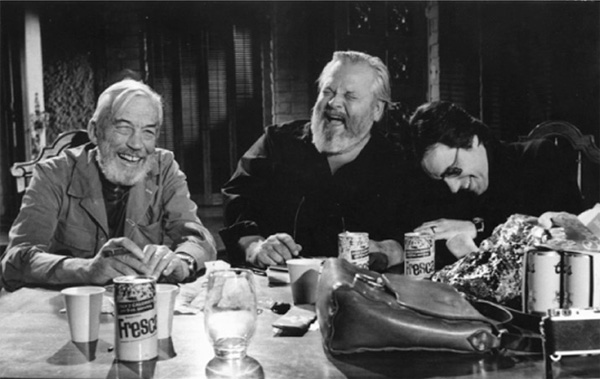
Peter Bogdanovich curated the first Orson Welles retrospective in the States in 1961, met the man in 1968 and conducted a series of interviews with him in the 70s that would eventually become This Is Orson Welles. And of course, that’s just scratching the surface. At any rate, Bogdanovich has posted the first part in what’ll surely be a substantial series, notes on “the Welles movies I saw 1952-1970, in the order they were seen, with ratings and comments from the movie card-file I kept during those nineteen years.” There are seven entries on Citizen Kane (1941), for example, the first written in 1956, the last in 1969.
“Who could begrudge Joe Dante the honor of an anthology volume dedicated to his work?” asks Zach Campbell in the Notebook. The co-editors of the new volume from the Austrian Film Museum are Nil Baskar and Gabe Klinger, so: “Because Klinger is a friend, this isn’t meant as an objective review per se, but as a larger discussion of the director, cinephilia, and some matters of film culture’s future.”
Jonathan Rosenbaum‘s posted his 2002 piece on “the extraordinary career of the Dutch-born leftist documentary and experimental filmmaker Joris Ivens (1898-1989),” and it reads like a whirlwind tour of the 20th century.
Fernando F. Croce‘s “Movie of the Day” is Elio Petri‘s A Quiet Place in the Country (1968): “Bergman’s cracked aesthete in Hour of the Wolf is besieged by the beasts of Symbolism, in this version the clammy psyche is a Rauschenberg cutout-collage of crumbling frescoes, stroke magazines and gooey hues.”
Moby’s video for David Lynch’s “The Big Dream”
From Alice Bolin in the Los Angeles Review of Books: “One question, ‘Who killed Laura Palmer?,’ spawned a genre—Veronica Mars, The Killing, Pretty Little Liars, Top of the Lake, and True Detective are notable descendants of Twin Peaks. All Dead Girl Shows begin with the discovery of the murdered body of a young woman. The series’ lead characters are attempting to solve the (often impossibly complicated) mystery of who killed her. As such, the Dead Girl is not a ‘character’ in the show, but rather, the memory of her is.”
IN OTHER NEWS
The new restoration of Richard Lester’s A Hard Day’s Night (1964) that premiered at the TCM Classic Film Festival a couple of weeks ago will open in over 50 cities nationwide on the July 4th weekend. Variety‘s Dave McNary has details.
Locarno‘s announced that Nansun Shi will receive the Premio Raimondo Rezzonico for Best Independent Producer at the 67th edition of the festival in August.
GOINGS ON
New York. Paul Holdengräber will interview David Lynch at BAM’s Opera House tonight, so at the L, Cara Cannella asks Holdengräber about the last time this happened, back in 2012 in Paris.
Vienna. The exhibition Blow-Up: Antonioni’s Classic Film and Photography opens tomorrow at the Albertina and will be on view through August 17.
IN THE WORKS
On May 22, Capricci will publish its first novel, C.L. Zois’s Life Guard—and the publisher’s announced that Abel Ferrara plans to adapt it in 2015. Zois wrote Ferrara’s Welcome to New York.
Beyond the Frame from Jp Diaz.
Ron Mann (Comic Book Confidential [1988], Grass [1999] and Know Your Mushrooms [2008]) is set to direct Altman for the cable movie channel Epix. More from Noel Murray at the Dissolve: “Mann reportedly spent a lot of time talking with the director’s widow Kathryn, who provided the project with rarely seen home movies.”
DVD/BLU_RAY
First up, Kino Lorber has announced that it’s launching KL Studio Classics, a new line for DVD and Blu-ray premieres. Slated for release this summer are Billy Wilder’s The Private Life of Sherlock Holmes (1970) and Witness for the Prosecution (1957), Delbert Mann’s Marty (1955), Martin Ritt’s Paris Blues (1961), Ralph Nelson’s Duel at Diablo (1966) and Sydney Pollack’s The Scalphunters (1968).
Secondly, Kaleidoscope Home Entertainment will be releasing a collection of films by Woody Allen on DVD on July 7 and digitally as of June 23, reports Kathryn Bromwich for Screen Daily. The Woody Allen Library includes Bullets Over Broadway (1994), Mighty Aphrodite (1995), Everyone Says I Love You (1996), Deconstructing Harry (1997), Celebrity (1998), Sweet and Lowdown (1999), Small Time Crooks (2000) and Barbara Kopple’s documentary on Allen, Wild Man Blues (1997).
“Hilarious and heartbreaking, Dino Risi’s Il Sorpasso is a textbook example of genre cinema that sneaks in its subversive subtext like a pimped-out Trojan horse.” Five out of five stars from Budd Wilkins at Slant. And Criterion’s posted Phillip Lopate‘s essay: “This miraculously entertaining film has lost not a whit of contemporaneous zing in the half century since its 1962 release. If anything, its disappearance from American distribution for many years allows us to appreciate it now with startled gasps of pleasure, as a newly unwrapped, jazz-scored, sleekly propulsive machine from the golden years of the commedia all’italiana.”
Sam Fuller‘s The Naked Kiss (1964) is showing on TCM tonight—and round the clock right here
Back at Slant, Jordan Cronk: “Joseph Losey‘s first film after being run out of the country in the wake of the Hollywood blacklist, Stranger on the Prowl [1952] nonetheless suggests at least as much formal experimentation as it does political restlessness.” And: “Though capable of cinematic beauty via Néstor Almendros’s cinematography, Sophie’s Choice, adapted from the novel by William Styron, is ultimately a terrible film, particularly because writer-director Alan J. Pakula commits an unforgivable, foundational sin.” Clayton Dillard explains.
OBIT
The Universidad Carlos III de Madrid has announced that professor, film historian and programmer Alberto Elena, author of The Cinema of Abbas Kiarostami and studies of the cinemas of Africa, Asia and Latin America, passed away this morning,
ENDNOTE
Stage Boundary Songs is a mixtape, a “musical response” to The Act of Killing, by DJ /rupture, aka Jace Clayton, who in the past has collaborated with Joshua Oppenheimer.
For news and tips throughout the day every day, follow @KeyframeDaily. Get Keyframe Daily in your inbox by signing in at fandor.com/daily.



